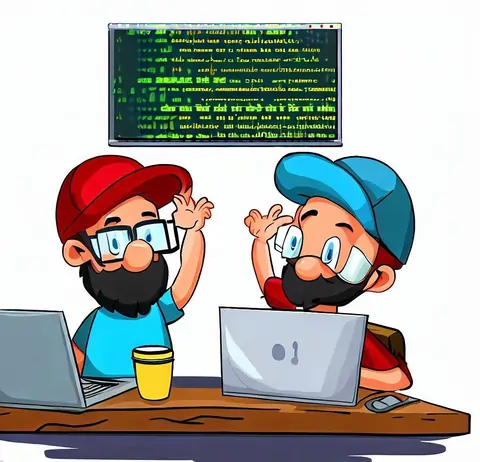Excelling in Erlang Homework: Broaden Your Subject Understanding with the Power of Internet, Library, and Collaborative Resources

It's essential to use a variety of resources when working on your Erlang homework to improve your understanding of the subject. You can access online tutorials, documentation, and discussion forums by making use of the internet, which gives you access to helpful information, justifications, and support from seasoned Erlang developers. You can examine real-world applications and become familiar with best practices by exploring open-source projects and code repositories on websites like GitHub. Erlang-specific library resources, such as books and eBooks, provide in-depth explanations, real-world examples, and organized learning paths. They also provide access to research papers that delve into complex ideas and cutting-edge trends. A supportive learning environment is fostered by classmate collaboration in group discussions, study sessions, and pair programming, which promotes the sharing of ideas, peer code reviews, and the improvement of problem-solving abilities. You can improve your comprehension of Erlang, perform well on your homework, and establish a strong foundation in this potent programming homework by combining a variety of resources, such as the internet, library books, and the collective wisdom of your classmates.

Why Relying on Multiple Resources is Essential for Solving Erlang Homework
Erlang homework requires a thorough understanding of its intricate concepts and syntax. It is crucial to use a variety of resources if you want to succeed in this difficult subject. You can improve your subject understanding and complete your Erlang homework by using the internet, library resources, and working with classmates. A wealth of information is available online, including tutorials, documentation, and online communities that offer insightful advice and assistance from seasoned Erlang developers. Advanced Erlang topics can be studied in-depth and explored using library resources like books, eBooks, and research papers. Working together with your classmates on projects, code reviews, and pair programming helps to create a positive learning environment that encourages knowledge sharing and learning speed. You can build a strong foundation in Erlang and master the challenges posed by your homework by adopting a multifaceted approach and making use of these various resources.
Harness the Power of the Internet
When learning Erlang and developing your programming skills, the internet is a priceless resource. Here are three methods for using the internet to improve your comprehension:
- Online Tutorials and Documentation: Many websites provide Erlang tutorials, guides, and documentation that can aid in your understanding of important ideas. Erlang programming video courses are available online at sites like Coursera, Udemy, and YouTube. To help you remember what you've learned, these resources offer exercises, code samples, and step-by-step instructions.
- Community Forums and Discussion Boards: Interacting with the Erlang community can help you find useful insights and solutions to programming problems. You can ask questions, get advice from seasoned Erlang developers, and learn new skills on websites like Stack Overflow, the Erlang mailing list, and specialized Erlang forums. You can improve your comprehension of the language by contributing to the community and taking part in discussions.
- Open-Source Projects and Code Repositories: Investigating open-source Erlang projects can introduce you to practical applications and best practices. Numerous Erlang projects are hosted on websites like GitHub where you can learn more about, examine, and participate in them. You'll learn more about Erlang's idiomatic style and find effective solutions to typical programming issues by looking at existing code.
Utilize Library Resources
Although there is a wealth of information available online, you should not discount the advantages of using library resources for your Erlang homework. The following are two ways libraries can improve your education:
- Books and eBooks: Many different programming books and eBooks, including those devoted to Erlang, are available in libraries. These resources frequently offer in-depth explanations, real-world examples, and exercises designed to aid in language proficiency. You can follow a set learning path and acquire a thorough understanding of Erlang's foundations by studying from reliable books.
- Access to Research Papers: Academic journals and papers on functional programming and Erlang are accessible through libraries. You can learn about advanced ideas, new trends, and cutting-edge Erlang methods by delving into academic articles. Including ideas from research papers in your homework can show that you have a more thorough understanding of the material.
Collaborate with Classmates
When it comes to completing Erlang homework, working with classmates is a powerful strategy that shouldn't be underrated. The chance to collaborate can lead to worthwhile learning experiences and greatly enhance your comprehension of the subject. You can participate in discussions, share knowledge, and trade concepts about Erlang programming by teaming up with your peers. Collaboration can help you learn about various viewpoints, strategies, and methods for solving problems while also enhancing your understanding of Erlang concepts. Through cooperative learning, you can take advantage of the group's collective intelligence, play to each other's strengths, and work together to solve problems. You can learn more about Erlang, solidify your understanding, and ultimately perform better on your homework by creating a supportive and engaging learning environment with your classmates. Here are three strategies for utilizing the expertise of your classmates:
Group Discussions and Study Sessions
A supportive learning environment can be created by setting up study sessions or creating study groups with your classmates. You can improve your comprehension of Erlang by getting together with other people to talk about the language's ideas, exchange knowledge, and work through issues as a group. Participating in group discussions enables the exploration of various viewpoints and methodologies, which can enhance your understanding of challenging subjects. Additionally, imparting knowledge to others strengthens one's understanding while fostering critical thinking and effective communication skills. You can encourage a collaborative learning environment that encourages knowledge sharing and mutual support by actively participating in group discussions and study sessions. This will help each member understand Erlang concepts more fully.
Peer Code Reviews
Reviewing each other's Erlang code in a group setting can be a useful way to find mistakes, talk about potential solutions, and absorb various programming approaches. You can actively participate in peer code reviews to gain from the perspectives and insights of your classmates. You can enhance the quality of your code, find areas for optimization, and learn new programming techniques with the help of constructive criticism from peers. Receiving feedback from others also improves your capacity for critical code analysis and the consideration of alternative strategies. Peer code reviews encourage a cooperative and welcoming environment where knowledge and expertise are shared, resulting in group growth and improvement in Erlang programming abilities.
Pair Programming
Pair programming with a classmate can help you learn Erlang faster and develop your problem-solving abilities. Together, you can overcome programming obstacles by utilizing one another's strengths, exchanging ideas, and working in real time. Because pair programming encourages active participation, accountability, and ongoing feedback, errors and bugs can be found and fixed more quickly. With this cooperative method, you can take advantage of in-the-moment discussions, investigate various viewpoints, and develop a deeper comprehension of Erlang's subtleties. Additionally, the constant knowledge sharing that takes place during pair programming sessions helps to find the best solutions and encourages original thinking. You can improve your programming skills, broaden your problem-solving toolkit, and gain a deeper understanding of Erlang's nuances by working in pairs with a classmate.
Enhancing Subject Understanding Through Self-Study
Self-study is essential for improving your subject knowledge and Erlang proficiency. You can customize your study strategy to fit your particular needs and pace by taking control of your educational journey. You can learn more about Erlang concepts, explore more resources, and solidify your understanding through practice with self-study. It gives you the power to establish clear learning objectives, set aside time specifically for studying, and adopt a methodical approach to mastering Erlang. You can experiment with real-world Erlang applications, concentrate on topics that need more attention, and engage in practical coding exercises through independent study. Self-study also cultivates self-control, critical thinking, and problem-solving abilities, preparing you to become an accomplished Erlang programmer and an independent learner. You can reach your full potential and gain a deeper understanding of Erlang by accepting self-study as a crucial part of your learning process.
Create a Personalized Learning Plan
It's essential to make a personalized learning plan if you want to maximize your subject understanding and perform well on your Erlang homework. Determine your programming abilities in Erlang's strengths and weaknesses first. Decide which particular subjects or ideas need more consideration and focus. Divide up your learning objectives into smaller, more manageable tasks, and set aside time for self-study. You can monitor your progress and ensure a methodical approach to your studies by setting reasonable goals and adhering to a schedule.
Utilize Online Learning Platforms and Resources
The abundance of online learning resources and platforms available on the internet can significantly improve your subject understanding. Investigate websites like Udemy, Coursera, or edX that offer in-depth Erlang courses taught by professionals. To help you remember what you've learned, these courses frequently include video lectures, tests, and hands-on activities. Use online coding resources like LeetCode and Codecademy, which provide interactive coding challenges and Erlang practice problems. These resources can help you reinforce what you learn in class, give you practical experience, and improve your comprehension of Erlang syntax.
Conclusion
In conclusion, it is crucial to make use of a variety of resources to complete your Erlang homework and advance your subject understanding. The internet is a helpful resource because it provides tutorials, documentation, and a thriving Erlang developer community where you can look for advice and support. Access to thorough books, academic papers, and other resources is made available by libraries, allowing for in-depth research and concept exploration. The exchange of knowledge and ideas that results from working together with classmates during discussions, code reviews, and pair programming not only promotes a positive learning environment but also speeds up learning. You can approach your Erlang homework with confidence, overcome obstacles, and build a solid foundation in this potent programming language by combining the strength of these various resources. Adopting a multifaceted learning strategy guarantees that you develop a comprehensive understanding of Erlang and become skilled at using its principles in homework and future projects.